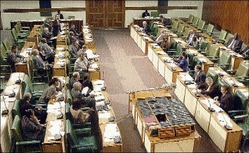
For the first time since 1944, the integrity of the composition of our legislature, in particular, the legitimacy of the Government is seriously in question. That is a message that has been sent by the ruling of our Court of Appeal which is constitutionally empowered to adjudicate finally on these matters.
That message appears to be lost on Shahine Robinson whose own right to sit in the House of Representatives is questionable. It would appear that the message is also lost on the leader of her party, which forms the Government, for we have not heard from him one word of rebuke of Robinson for her effrontery in labelling the exercise to regularise that situation "a waste of energies, time and money".
Qualification

Robinson,
There can be no matter of greater importance to the manner in which we are to be governed than the composition of our Parliament and the qualification for membership of the Senate and the House of Representatives.
The provisions relating to these matters are of such substance that they are among the very few areas of our constitution which require the vote of the electorate in a national referendum for any change to be made. These provisions are what are referred to as being deeply entrenched.
Other provisions which fall within that same category include the times within which sessions of Parliament may be held; prorogation and dissolution of Parliament; and the executive authority of Jamaica (the head of state) which is vested in Her Majesty. Any change to these provisions can only be accomplished by means of a referendum.
Every person has his foibles, his own idiosyncrasies, and regardless of the view that one may choose to hold of Abraham Dabdoub, he clearly will have a place of real significance in Jamaica's legal history. And yet, the initiative that was started by him to ensure that the integrity of our Parliament is not compromised is referred to by Robinson as a waste of time.
Well, let us examine what that initiative has accomplished so far. First, it has given rise to an inquiry in our courts concerning the constitutional provisions relating to disqualification for membership of the two Houses.
Second, we now know some of the circumstances in which a by-election is to be held when certain issues are in question. Third, there have been suggestions coming from the prime minister, the president of the Court of Appeal and several voices in the public arena that the time has come for a review of the provisions touching upon qualification and disqualification for membership.
It may be that Robinson, in thumbing her nose at the exercise, is simply following the lead of the head of government who regards the initiative and, supposedly, its outcomes as a "blatant attempt to constitutionally overthrow" his government, brushing aside the fact that the legitimacy of his government is itself in question.
For, it is obvious that both he and Robinson perceive an obtuse motive in an initiative which will drive our parliamentarians to uphold the provisions of our constitution which is a document having a special legal sanctity and which "sets out the framework and the principal functions of government and declares the principles governing the operation of those organs".
According to that framework document, the establishment of Parliament, which consists of Her Majesty, a Senate and a House of Representatives, and qualification for membership to either House, can only be changed by means of a vote by the electorate in a referendum. The present questionable membership, certainly of the House of Representatives, should serve to rivet into our minds the deep significance of the constitutional strength that the framers attached to those provisions.

Parliamentarians at Gordon House, November 12, 2008. - File
Constitutional rules
Consider, for example, a situation in which the Government side of Parliament or, indeed, the entire Parliament itself is empowered to come to a decision as to which persons may be qualified to sit in the Houses! This would mean that Robinson and her fellow travellers on either side would be in a position to be involved in the change of those constitutional rules even with the impediment with which they might be clothed.
And Robinson's case is even more stark, for the allegation is that while she was serving as member of Parliament, she placed herself under an acknowledgment of allegiance, obedience or adherence to a foreign power. If that is true, not only would she have been disqualified for election as a member in the 2007 general elections exercise, but her seat should have become vacant before that time, when she made such declaration of acknowledgment.
By parity of reasoning, Robinson must certainly be claiming that the question of whether she herself is legitimately in the House is a complete waste of time. Does such an utterance from the floor of the House not amount to contempt of Parliament? Should the speaker not have intervened on that score and also because of her comments which amount to pouring scorn on an exercise which includes matters being considered by the Supreme Court?
Is Robinson saying that, as lawmakers, we should just "leave well alone", as sadly, many Jamaicans at home and abroad have suggested? Is she not in a position to help us to move more speedily to remove the shadow which hangs over our Parliament in these otherwise stressful times?
The head of government continues to stress that any question as to the validity of membership of either House is to be determined by the Supreme Court, as if to suggest that that is the only means by which matters relating to adherence to constitutional provisions may be resolved.
The interpretation of every provision in our constitution is to be determined by the Supreme Court and the reason that it is spelt out in this specific provision is to emphasise that the ruling of the Court of Appeal in these circumstances is final.
The question as to whether members of the Public Service Commission have been validly removed from office for misbehaviour is required to be determined by the Supreme Court.
But even so, Golding and the members of the former Public Service Commission arrived at an agreement before the Supreme Court determined whether the prime minister had acted correctly in having them dismissed for misbehaviour. The prime minister backtracked and sought to make matters right. In like manner, matters can be made right by Robinson and her colleagues if the will exists to abide by the rule of law and to uphold the Constitution of Jamaica.
Speaking on a political platform in North East St Catherine recently, the prime minister stated that he had written to the leader of the Opposition seeking to have the issues relating to the dual citizenship problem resolved, noting that it affected both sides of the House.
He asserted that his side did not go to court with these matters by way of an election petition because of the challenges of government and they did not consider the qualifications for membership to the House to be a matter of priority.
According to him, he is now seeking consensus on what changes may be required to be made to the relevant provisions of the constitution in this regard, declaring that three sections of the constitution, namely, sections 9, 39 and 40 would have to be examined. Golding claimed that the Government side can make such changes "and pass them with the majority that we have, for they are not entrenched".
Dangerously faulty
The advice that the prime minister received on this score is dangerously faulty. It is certainly true that section 9, which outlines matters relating to "Commonwealth citizens", and section 40, which deals with "Disqualifications for membership of the Senate and the House of Representatives" are not entrenched, and may be amended by the affirmative vote of 31 members in the House and 11 members of the Senate.
Section 39, however, directs that only an adult Commonwealth citizen who has been ordinarily resident in Jamaica for the immediately preceding 12 months shall be qualified to sit in our Parliament. The section ends with the words, "and no other person shall be so qualified". The only manner in which these provisions can be changed is by the vote of the electorate in a referendum.
These are weighty matters that have to be addressed as we seek to bring "Brand Jamaica" to our constitutional arrangements in a 21st-century world. Shahine Robinson, a putative lawmaker, thumbs her nose at such issues. Help!
A.J. Nicholson is Opposition spokesman on justice. Feedback may be sent to columns@gleanerjm.com.